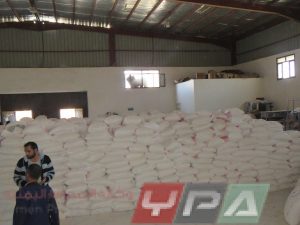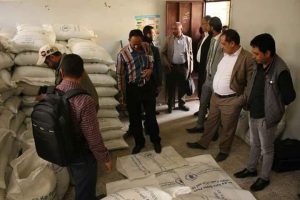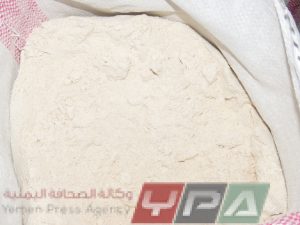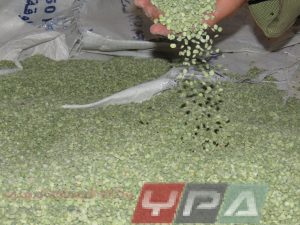SANAA, Feb. 28 (YPA) – The World Food Program (WFP), which has been given great confidence by Yemenis to provide aid to their children, women, and their bereaved sons, who are displaced and affected by the US-backed War on Yemen, has failed the confidence of Yemenis, reports say.
In a new scandal in the Yemeni capital Sana’a, the reality of the horrific crime committed by the World Food Program against the Yemeni people is now openly released.
The official authorities in Sana’a announced that WFP food stores at Baghdad School and al-Motassim in the Yemeni capital contain large quantities of rotten food, and are unfit for human use.
The Yemen Press Agency received a telephone call from one of Sanaa’s officials inviting them to visit the two schools, photographing the contents of the World For Program stores that have only recently arrived in Yemen as aid to children, women and hundreds of thousands of hungry people, and has concluded that these food quantities expired and eaten by thousands of worms.


The scandals unfolded as the food was distributed to the Yemeni people, as deadly poison stores were transmitted among Yemenis by certain global “humanitarian advocates” under the guise of aid and relief.
The correspondent of the Yemeni Press Agency has testified that there are large quantities of flour, sugar and vegetables that are unfit for human use, as they are infected by huge amount of skunk worms.


The Standards and Quality Assurance Authority in the capital of Sana’a has confirmed in a letter that the foodstuffs that are housed in a number of warehouses are damaged.
“The quantities damaged in only these two stores of the program alone, exceed 200 tons of flour, and nearly 4,000 bags of sugar,” said the Director of Legal Affairs at the National Authority for the Management and Coordination of Humanitarian Affairs to Yemen Press Agency.


According to Mokhtar al-Faqih, “Officials in Sana’a and Taiz schools, as well as several members of local councils in Hodeidah, Ibb and Mahwit provinces have reported that relief food distributed to parents by WFP contain small worms, and are demanding the withdrawal of these quantities from the distribution centers of WFP. ”
“This food makes the current situation of Yemenis worse, especially since tens of thousands of families are in dire need of this assistance because the war has robbed them of the source of their livelihood. Their dependence on these foods may force them to consume this food them even if it is not fit for consumption”, al-Faqih said.
“This is a serious health threat, to which vast segment of society will fall victim.”
“We received reports from the directors of the relief distribution centers that there is decay in some of the green peas and flour, so we have made a visit with the Yemeni Standards Authority and the Office of Social Affairs and Work “, Dr. Mohammed Al-Asbahi, Director of Educational Health at the office in Sana’a said.
He confirmed that they searched the reported warehouse to find large amounts of damaged food, infested with insects.
Al-Asbahi pointed out that they had seized large in the store in the presence of the prosecutor, adding that “the prosecutor informed us in a timely manner of the preservation of these materials and warned us not to allow their distribution because it violated the conditions of quality and are not suitable for human use”.
He stressed that such food “does not solve the problem but puts pressure on the coalition to stop the war, and provide good relief assistance that does not entail any health complications, because this aid affects the health of consumers, especially those who are displaced by diseases.”
For his part, a specialist at the Yemeni Authority for Standardization, Metrology and Quality Control, Mohammed al-Sherhi, said that “The program will be informed to preserve these quantities that we were able to inspect and classify them unusable, and therefore must be damaged in designated places.”
“For the sugar and flour in the two warehouses, samples were taken for examination and we will announce the results of the examination in the coming days, and the likelihood of damage is very large because of its presence near the damaged peas. This damage can be caused as a result of storage for a long time without attention to maintaining the healthy atmosphere of the place.”
The World Food Program (WFP) said in late 2018 that the humanitarian aid needs in Yemen will reach 14 million human cases in 2019. This means double of the number for the past year, when about eight million Yemenis were threatened with malnutrition, especially children and the elderly, and the number of children under five who have died of malnutrition reached 80,000.
The suffering of Yemenis is further exacerbated by the ongoing war and blockade, which have caused displacement of thousands, the disruption of jobs and the collapse of the local currency.
E.M


